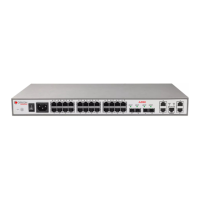A10E/A28E/A28F Configuration Guide
Enter global configuration mode.
Alpha-A28E(config)#rmon
statistics { ip
if-number
| port-list
port-list
}
[ owner
owner-name
]
Enable RMON statistics on an interface
and configure related parameters.
By default, RMON statistics of all
interfaces is enabled.
When using the no rmon statistics{ port-list port-list | ip if-number } command to
disable RMON statistics on an interface, you cannot continue to obtain the interface
statistics, but the interface still can account data.
9.3.5 Configuring RMON historical statistics
Configure RMON historical statistics for the A10E/A28E as below.
Enter global configuration
mode.
Alpha-A28E(config)#rmon history { ip
if-number
| port-list
port
-
list
}
[ shortinterval
short-period
]
[ longinterval
long-period
] [ buckets
buckets-number
] [ owner
owner-name
]
Enable RMON historical
statistics on an interface
and configure related
parameters.
When using the no rmon history{ ip if-number | port-list port-list } command to
disable RMON historical statistics on an interface, the interface will not account data
and clear all historical data collected previously.
9.3.6 Configuring RMON alarm group
You can monitor a MIB variable (mibvar) by setting a RMON alarm group instance (alarm-
id). An alarm event is generated when the value of the monitored data exceeds the defined
threshold. And then record the log or send Trap to the NView NNM system according to the
definition of alarm events.
The monitored MIB variable must be real, and the data value type is correct.
If the setting variable does not exist or value type variable is incorrect, return error.
For the successfully-set alarm, if the variable cannot be collected later, close the alarm.
Reset it if you need to monitor the variable again.
By default, the triggered event ID is 0, which indicates no event is triggered. If the number is
not set to 0 and there is no event configured in the event group, the event is not successfully

